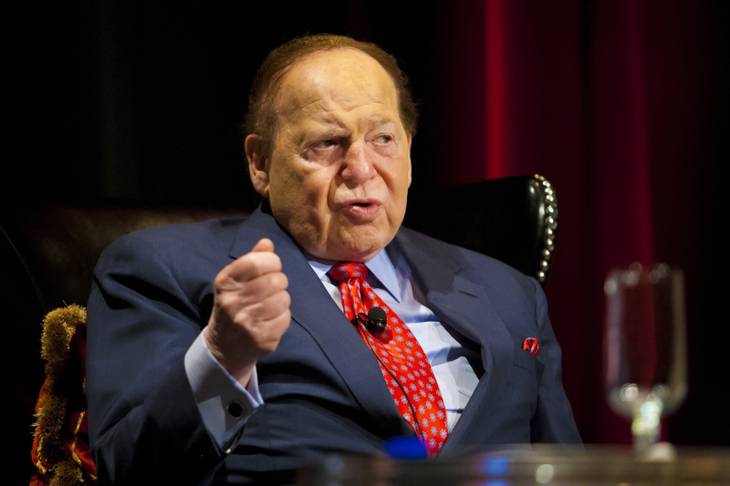Related news
- Online gaming hasn’t lived up to its hype
- New Jersey finds ‘poker tourism’ increasing for online games
- Internet poker revenues outgaining only bingo, Nevada regulators report
- No poker exception in new legislation in Congress to ban online gaming
- Nevada-Delaware online poker deal might have stirred gaming foes to act
- Legislative panel mulls how to protect Nevada’s online gaming interests
- Online poker starting to pad companies’ bottom line
- MGM Resorts’ Jim Murren on online poker, social media, competition and the Red Sox
Online gaming remains a divisive issue for Nevada casino companies, which are pouring money into lobbying on the issue while they joust over a potential ban.
The proposed ban, contained in a measure championed by Sen. Lindsey Graham, R-S.C., and Rep. Jason Chaffetz, R-Utah, has helped trigger hundreds of thousands of dollars in spending from the gaming industry. One side, led by Las Vegas Sands CEO Sheldon Adelson, is in favor of the prohibition. Others, including Caesars Entertainment, are fiercely opposed.
But amid the flurry of spending, congressional action is moving slowly. Legislators left for their August recess without seriously advancing a measure introduced in March that would prohibit online gaming nationwide, and its fate for the rest of the year is uncertain.
If enacted, the Restoration of America’s Wire Act from Graham and Chaffetz would make gambling on the Internet illegal. The legislation was referred to committees in both chambers but hasn’t moved any further.
Govtrack.us, a website that monitors congressional actions, gives the Senate bill a 1 percent chance of being enacted and its House counterpart an 8 percent chance.
A ban would roll back the efforts of states that have already moved ahead on online gaming. Nevada legalized online poker in 2013, more than a year after the Department of Justice reinterpreted the Wire Act of 1961 to allow for gaming on the Internet in states where gambling is legal. Delaware and New Jersey have also passed online gambling laws, and other states are considering their own.
Robert Shore, an analyst for Union Gaming Group, said Congress has little incentive to act for now because online gaming has been legalized in few places.
“If more and more states would enact online gaming at the state level, I think at some point there would be more interest for a federal bill,” he said.
That hasn’t stopped supporters of the ban.
Las Vegas Sands spent $290,000 during the second quarter for lobbying exclusively on online gaming or related legislation, according to OpenSecrets.org. Adelson has been a vocal critic of online gaming, saying he would spend “whatever it takes” to fight it. Adelson says he is morally opposed to online gaming, which he says will cost hundreds of thousands of jobs and help breed crime. Las Vegas Sands did not respond to a request for comment.
Members of Adelson’s extended family also gave $15,600 to Graham, who is running for re-election this year, according to OpenSecrets. The Sands’ PAC gave him $5,000.
Additionally, the Coalition to Stop Internet Gambling, backed by Adelson, continues to advocate for Graham's and Chaffetz’s legislation. And in a letter dated July 28, Graham, Sen. Dianne Feinstein, D-Calif., and Sen. Kelly Ayotte, R-N.H., urged the Justice Department to back the ban.
“The FBI has warned it will open the door to money laundering and other criminal activity,” the senators wrote of online gaming. “And, it is bound to prey on children and society’s most vulnerable.”
The senators said in the letter that they “fully expect the Senate will act on our legislation this year.”
Notably, however, Nevada senators Harry Reid and Dean Heller don’t appear inclined to speed up the process. They’ve yet to come out decisively one way or the other on the measure from Graham and Chaffetz, although both of them reportedly support legalizing poker only.
Adelson's opponents in the online gaming debate are spending heavily on lobbying as well. Caesars Entertainment, for example, spent $980,000 in the second quarter to press for issues that included online gaming, according to OpenSecrets. Boyd Gaming spent $230,000 in the same quarter, and MGM Resorts has spent $240,000 this year, OpenSecrets reported.
Tom Russell, director of the Coalition for Consumer and Online Protection, said his group is doing its best to ensure that the ban suggested by Graham and Chaffetz — which he called “Mr. Adelson’s bill” — doesn’t pass. Caesars supports the coalition and deferred questions to the group.
Russell warned that a ban wouldn’t prevent people from gambling online. He said there are places where online gaming is illegal and people just use risky unregulated sites instead.
“It’s really unrealistic for Congress to step into the role of, for all intents and purposes, trying to put the Internet back in a bottle,” he said.
